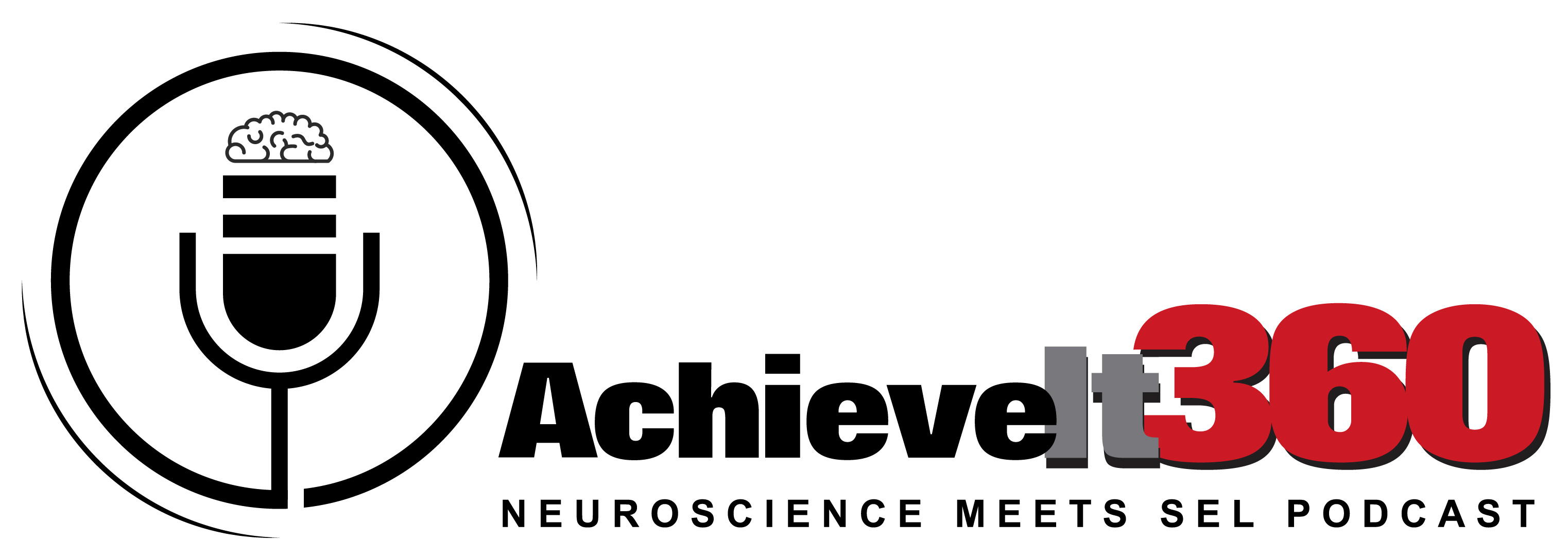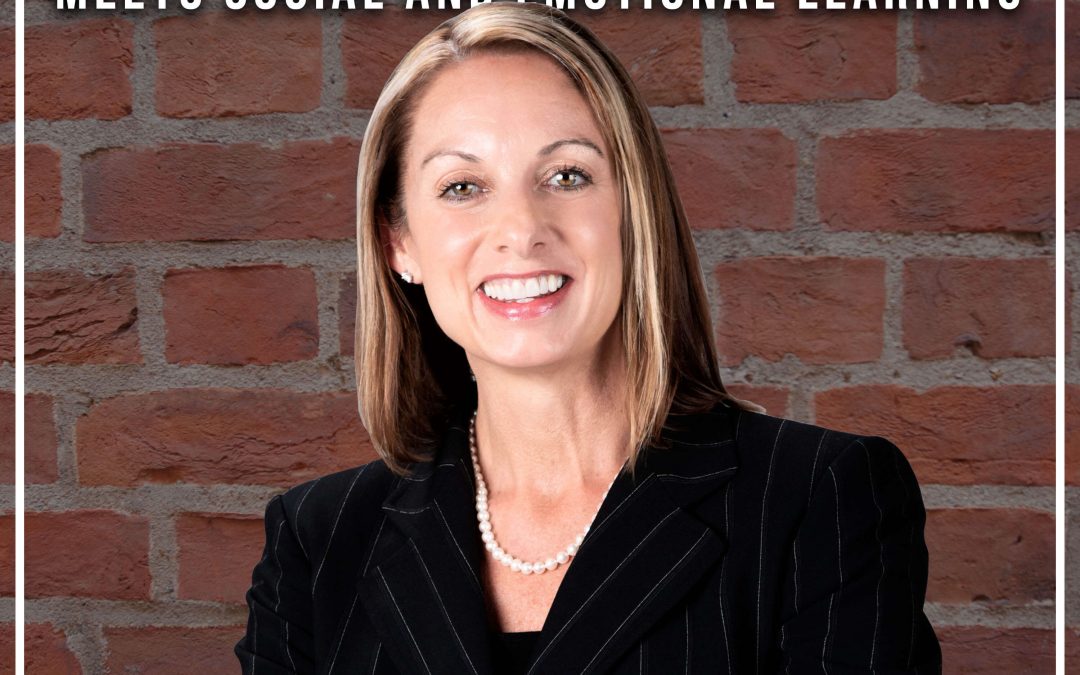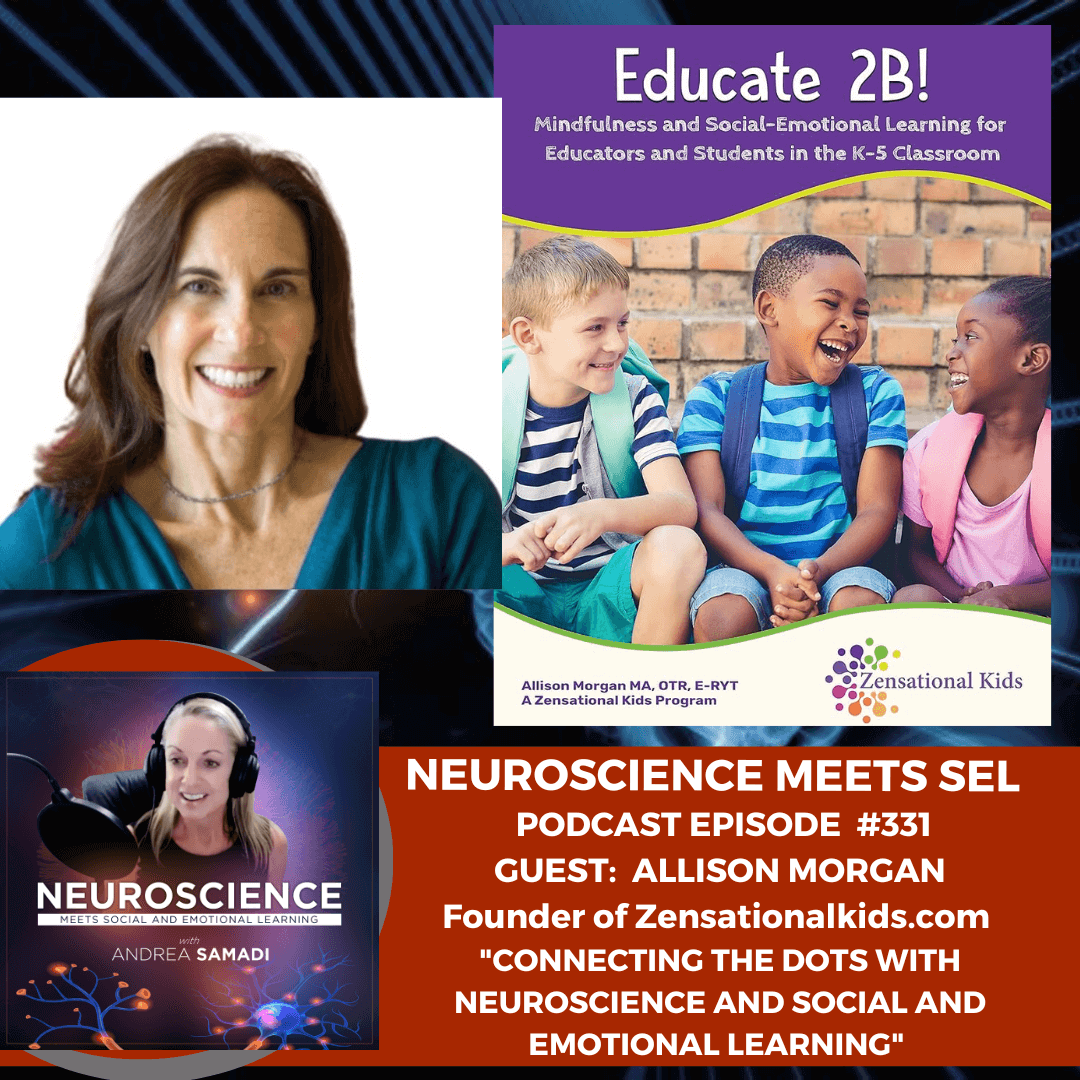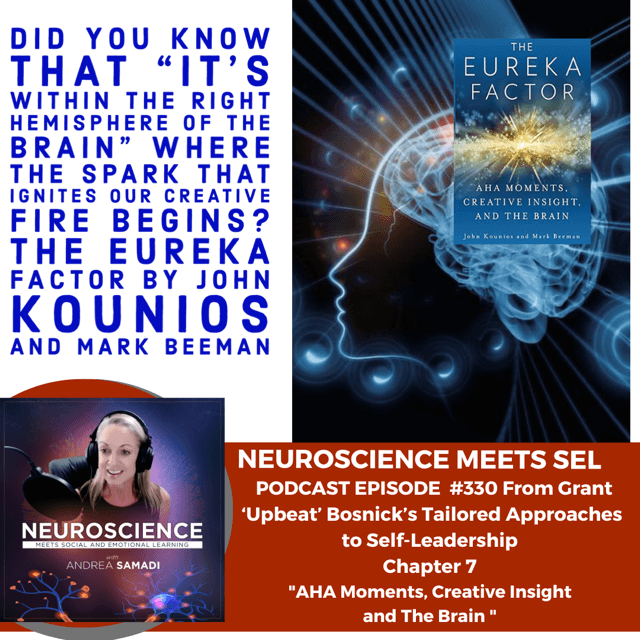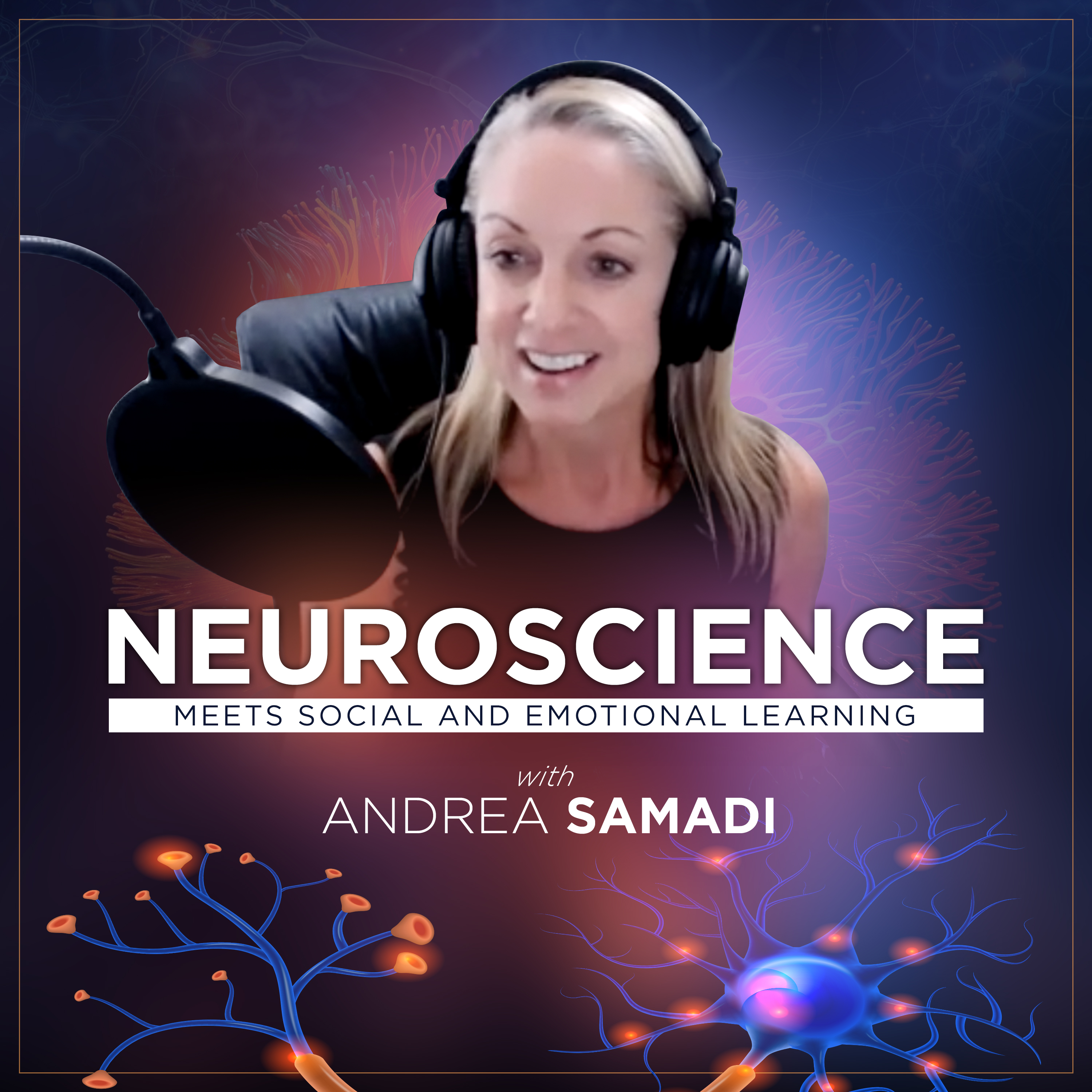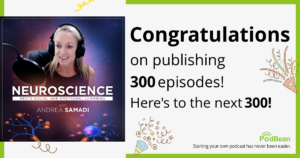In this episode, we will introduce the first of six social and emotional learning competencies (self-awareness) that we will be diving deep into over the next six weeks. With each competency, we’ll investigate the best practices and strategies that educators/and the workplace can use for themselves to develop and improve their own SEL/Emotional Intelligence and well-being practices, before extending these strategies to their districts, schools, classrooms, workplaces and communities. We’ll offer ideas, tools and resources (in the show notes section) so that anyone can apply these skills themselves, and then teach others for improved results, focus and productivity.
With the buzz of the importance and need of social and emotional learning in our schools (and emotional intelligence training in our workplaces), we all know that developing a child’s SEL skills is just as important as their academic content to ensure student motivation and success throughout their school years as well as in their future careers. We do know that students with strong SEL health “demonstrate self-control, communicate well, problem solve, are empathetic, respectful, grateful, gritty and optimistic.”[i] All of the skills our workforce is actively looking for.
We also know that neuroscience has advanced our understanding of these SEL skills. We know that there is a clear connection between educator cortisol increase and student cortisol increase, (meaning that when teachers are stressed, the students will in turn be stressed) and that teachers who demonstrate social and emotional learning competencies (like self-awareness, social awareness, self-regulation, decision-making, relationship building) are more likely to stay in the classroom longer because they are able to work more effectively with challenging students—one of the main reasons for educator burn out. This is something I remember well—since this was one of the reasons I left the classroom over 20 years ago. I wish I knew the research and had some of the tools that I know now, and the importance of working on myself, before considering an impact on others. I hope these ideas, can help offer solutions to deepen the student/teacher relationship as well as connect teachers back to their profession, providing them with that feeling of autonomy, and peace that we all are looking for in our workplace.
In the corporate world, these skills aren’t new, but they are “newly important” and of high urgency to develop in our future generations. A recent survey showed that 58 percent of employers say college graduates aren’t adequately prepared for today’s workforce, and those employers noted a particular gap in social and emotional skills. Our goal with this podcast is to close this gap by exploring six social and emotional learning competencies as a springboard for discussion and tie in how an understanding of our brain can facilitate these strategies. We want the ideas you take away with you to be actionable whether you are an educator working in a school, an employee of manager in a corporation, or someone just looking to take their skills to the next level. We have done all of the research for you and look forward to hearing about the results that you create.
Self-Awareness
Today we will begin with Self-Awareness to kick off our first SEL competency since to “know thyself” is the most substantial achievement we can have in our lifetime.
“The major value in life is not what you get. It’s what you become.” (Jim Rohn, American author, speaker and entrepreneur).
So let’s take a deeper look. What is self-awareness, why do we need it, and how can we get more of it?
Self-awareness is “the ability to see ourselves clearly, understand who we are, how others see us and how we fit into the world.”[ii] When we have self-awareness, we have a power within ourselves because there is a comfort in knowing who exactly who we are and where we fit into the larger world around us. Research shows that “people who are more self-aware have stronger relationships, are more creative, competent are better communicators and perform better at work.”[iii]
Here’s 6 Steps to Becoming More Self Aware
- Know Thyself and Then Build Yourself Up With Self-Esteem and Courage: Have you taken the time to think about who you are? Do you know where you fit into your school, workplace, community, state, country and world? Do you know what your purpose is? Your Why? You are more than just an educator or employee in a corporation, but have you thought about, who exactly you are? If you work in the corporate world, I’m sure you can see that you are more than the day to day job that you are doing. Take some time to think about who you are. Let’s say that you were looking for a new job but lacked some of the skills listed in the job description. You know that you can learn these new skills, but now you must believe it and convince the person who will be interviewing you. The key to increasing your self-esteem is to build up your image of yourself, creating new neural pathways in your brain with your desired self-image and by weakening the old negative self-image that you don’t want anymore (perhaps the image of you in your current job or position). You can do this a few different ways but some of the most effective and proven strategies are:
- Daily guided meditation focusing on building new neural pathways in the brain…thinking about the desired outcome.Affirmations that you write yourself to create new neural pathways.Stop caring about what other people think and just be yourself. Ignore the nay-sayers.Stop comparing yourself to others!
Strong Self-Esteem (what you think of yourself) + Strong Self-Image (how you think others see you) = Confidence that Builds Competence you will need for the new position —-Creating Extra Energy to Overcome Obstacles that you will face and help you to reach the higher level of achievement. You have to believe and trust in yourself and your abilities in order for others to believe in you. Once you have mastered this skill, you will be well on your way to accomplishing anything.
Building Your Self-Esteem by Improving Your Courage
Brené Brown defines the original meaning of courage as “To share all of yourself. Share your whole story with your whole heart” [iv] even if we must share our vulnerabilities, fears and weaknesses. Remember that everyone has doubts, fears and insecurities. Those who can move forward despite them, are the ones will win. Being courageous also means to be vulnerable enough to share your weaknesses with others. This will allow you to ask for help when you need it.
Without courage you will never move up or forward in life. Remember: There will be no innovation without failure.
To put this into action—whether we are an educator, working in a school, an employee, working in a corporation, or an athlete on a sports team, we must know how our identity fits into the goals of our school, organization or team to reach our greatest levels of achievement. Once we know our identity, and how we fit in, we can begin to hone our skills to take us to the next level. There must be a reason you are showing up to school/work/practice/life day in and day out that goes beyond the grades/money you will earn for you to tap into your highest levels of achievement.
“Schools have a role in shaping students’ development of their own identity, agency, and a sense of purpose in their learning, as well as a role in preparing students with high level knowledge and skills they need to be thriving adults.” (Integrating Social, Emotional and Academic Development: An Action Guide for School Leadership Teams) page 4
For educators: Do you think about the identity of each of your students? Who are they? Do you know something about each one of them? Do you know/use their name? Can you keep up a conversation with them? Do you know what your students are passionate about? Can you tie this into your lesson? Beware of our tendency to teach others how we like to learn best. Be aware of individual student needs.
For workplace managers: Do you know your team members? Just like an educator who knows what motivates their students, do you know what motivates your employees? Why are they working in their current position? Can you tie this into your day to day interaction with them?
Once you know yourself it’s now more about “aligning” to your true self. When you go off track, you will know it (you will feel out of synch and disconnected) and it will be up to you to know yourself well enough to get yourself back on track where things just flow.
-
- Don’t limit yourself: Remember to be careful of labelling yourself based on past performance. “Self-analysis can trap us if we don’t learn to let go of the past.”
- We cannot base our decisions of what we think we are capable of doing based on what we have done in the past. When things go wrong in our lives, it can taint our self-image and prevent us from reaching for things we really want to be, do or have. Be careful of this trap as you think about who you are. Think about the times when something failed as a lesson that you learned from—not that there is anything wrong with you or your capabilities—but that you were not meant to be doing what failed—at that specific time. In a world where it didn’t matter if you failed, what would you want to be doing? Not the things you know you can do already, (that are easy) or the things that don’t bring you excitement. What do you think about that brings you energy, excitement, joy, passion, perhaps some fear at the thought of it? This is where you must focus your attention to stretch, grow, and allow your true self to emerge.
- Keep Stretching Yourself: Have you ever been given an assignment where you thought there was no way that you could complete this? It just seemed to be above your head, above your current capabilities. I have—for sure, but I still accepted the assignment with the goal to grow and challenge myself and it feels incredible when you complete something you thought you could never do at the start! What we find is that we often don’t know what we don’t know and that we are capable of doing much more than we think we can accomplish. Be sure that every quarter (four times a year) you think about whether you are really stretching yourself (with your career/work/finances, your health, relationships, and your contribution to the world). Is there something you have always wanted to do but just have no idea where to begin? Write down the ideas that come to mind and find someone who has done what you want to do. Finding a mentor to coach or guide you along the way is a surefire strategy to ensure that you take action.
-
- Know Your Values: Do you know what values are important to you? Life and decision-making becomes much easier when you are clear on your top values. I keep 5 values in front of me at all times and when I’m working, and something comes up, it’s not difficult to glance over at what I have already acknowledged is important to me when making decisions. There are many ways to uncover your values or things that are important to you in your life. You can hire a coach to help you discover your values
- like I have done or discover them with some introspection. Try this activity to uncover your values. Take a piece of paper and on one side label it “Want This in My Life” and the other side is “Don’t Want This in My Life.”Think about your personal life and work life and start to fill in your list of all the things you want or don’t want. You should be able to identify common themes or words will emerge as your values or things that you want in your life. You can also become clear of the things you DON’T want in your life by thinking of times when things were not going right in your personal or work life. Common themes will emerge on both sides of the list and you can identify things that are important to you. For me, my top values include health, growth and challenge. So, when making work decisions, I usually think “will this project offer me growth and challenge.” If not, I know to pass up the project as I will probably be bored and not do my best work. Same goes when learning how you operate in your personal life. If something goes against your values, you will know it, won’t be as productive and you will feel conflicted. It’s a lot easier to know your values up front to eliminate making choices that aren’t right for you.
- Create a Morning Routine: Creating a morning routine will simplify your life and warm up your brain. When you wake up, the oldest part of your brain begins to drive you towards your goals that have rewards attached to them. You can make it easier on your brain and eliminate decision fatigue (where you waste energy unnecessarily) or set yourself up for success with some careful planning the night before. Research shows that if you can take the time for a morning routine that involves becoming aware of your mental state, your brain will function much better for the rest of the day. You will be able to do more, with less stress.
- Wake up, stretch, and focus on how you feel. What do you notice?Focus on the positive parts of your day.Visualize overcoming any obstacles that you can foresee.Prepare for your day the night before to eliminate decision fatigue.
- Be More Outward Focused: Finally, think about how you can help others.
For Educators: Who are your learners? Turn your attention to your students. Do you have strategies to help them discover their strengths? Help them to find out what they are passionate about. How can you bring their strengths/passions into your lessons to help motivate them? Do they have some idea of how their interests tie into the career that they are working towards? I remember a student I was working with last year who was into cars. His face lit up when I gave an example using a car shop and asked him to answer the question…using something he cared about.
For the Workplace: Who are your employees? How can you help support or encourage them? Do you take the time to connect and check in with them at least on a weekly basis? Do you know what motivates them? What can you do to encourage them further?
Outcomes and Results:
When we can identify our true self, we can begin to focus on what difference we will make for others, not dwelling on past mistakes but using them as a catalyst to learn and grow from and create more meaning in our lives.
TO RECAP THIS EPISODE on the 6 Steps on Becoming More Self-Aware, we covered:
- Take some time to get to know yourself and discover your identity. Learn how you fit into your school, community, workplace, organization or team. Improve your courage with a strong self-image (what you think of yourself). Having a strong self-image is crucial to ensure that nothing will knock you off course with your goals, however, everyone will experience self-doubt. You must have strategies in place to help you to move past these blocks, and mentors to guide you along the way.Don’t limit yourself. Be careful not to base your future decisions of what you think you are capable of doing based on what you have done in the past. What do you think about that brings you energy, excitement, joy, passion, perhaps some fear at the thought of it? This is where you must focus your attention to stretch, grow, and allow your true self to develop.Keep stretching yourself to reach beyond where you think you can go. Find a mentor to coach or guide you along the way.Know your values and decision-making is much easier.Create a morning routine to simplify your life.Be outward focused and give back to others.
That wraps up our 2nd episode on Strategies to Become more self aware. We hope you find the tips helpful! Next episode we will dive deeper into Social-Awareness and Looking Beyond Yourself to Help Others.
Resources:
The Montgomery County (Ohio) Education Service Center and Ohio Department of Education video on Self-Awareness https://vimeo.com/339138555/1316a95190
VIDEO YouTube “5 Strategies to Improve Your Self-Awareness” (3:08)
https://www.youtube.com/watch?v=R-lmNqWUvWI&list=PLb5Z3cA_mnKj5C1ZYZt2bFXnDXFTENhPR&index=6&t=13s
[i] SEL: The Why and Hows of Implementation in a School District (Edweb) https://home.edweb.net/webinar/sel20190404/ (April 4, 2019)
[ii] “Increase Your Self-Awareness with One Simple Fix” YouTube uploaded Nov. 2017 Tasha Eurich https://www.youtube.com/watch?v=tGdsOXZpyWE
[iii] “Increase Your Self-Awareness with One Simple Fix” YouTube uploaded Nov. 2017 Tasha Eurich https://www.youtube.com/watch?v=tGdsOXZpyWE
[iv] Dr. Brené Brown: The Two Most Dangerous Words in Your Vocabulary | Super Soul Sunday | OWN (4:06) Published on March 17, 2013. https://www. youtube.com/watch?v=4XTcB1evO8c
[v] “Increase Your Self-Awareness with One Simple Fix” YouTube uploaded Nov. 2017 Tasha Eurich https://www.youtube.com/watch?v=tGdsOXZpyWE
[vi] Email Values Coach Fran Henry Fran@ultimate.life for more information on values coaching.
Podcast: Play in new window | Download
Subscribe: Apple Podcasts | RSS
